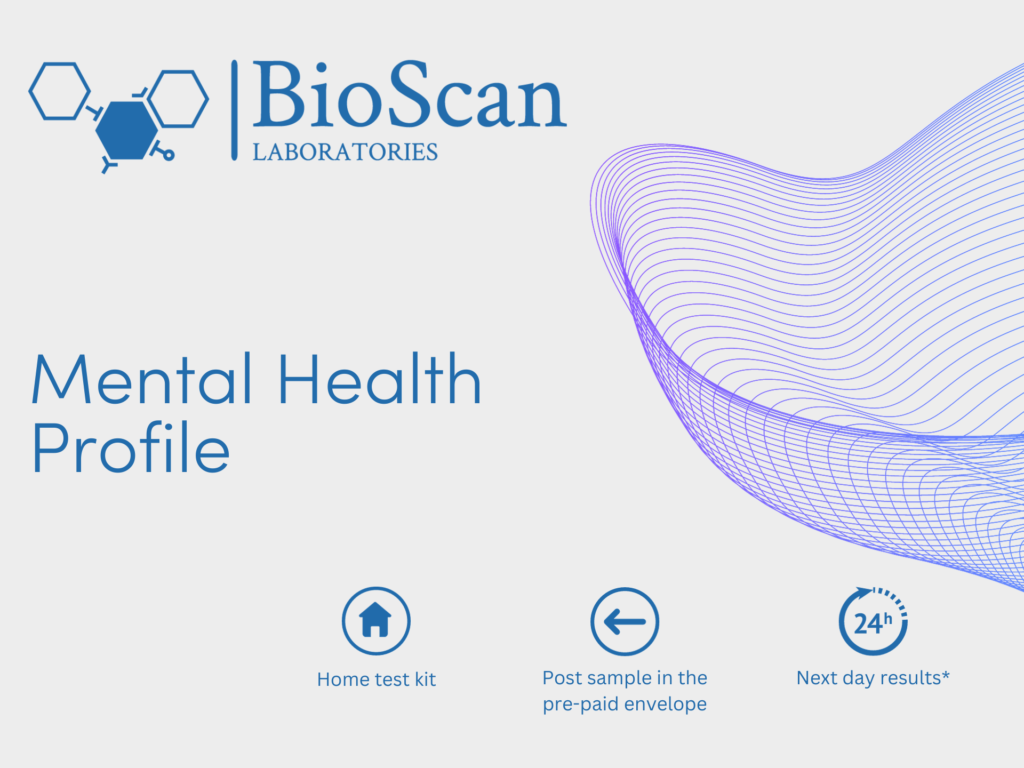Mental Health
Profile
£199.00
Mental health is not just about the mind, but also about the body. There are several physical conditions that can have an impact on mental health, such as thyroid dysfunction, anaemia, diabetes, and vitamin deficiencies. In addition, some medications used to treat mental health conditions can affect other bodily functions, and it’s important to monitor these effects.
We have a department of psychiatric mental support staffed by qualified doctors who are capable of assessing an individual’s mental health, taking into account both the physical and psychological aspects of their condition. This multidisciplinary approach ensures that when physical health issues are identified that may affect mental health, we can offer a seamless transition to psychiatric assessment and support, if necessary. Our team works closely together to provide a tailored approach to each individual, addressing their unique needs from a holistic perspective.
We encourage individuals considering our test kits to use them as part of a comprehensive health assessment, in consultation with their healthcare provider. For those who utilise our kits, we offer the option to connect with our psychiatric mental support department for further evaluation and support, ensuring that all aspects of their health are considered in their treatment plan.
Contact info@test3.ardenatech.com for treatment plans.
Home Test Kit
£199.00
Home Test Kit
£199.00
HbA1c
Urea and Electrolytes
Liver Function
Iron Parameters
Thyroid Function
Bone Markers
Lipids Function
Cardiac/Muscle Enzymes
Vitamin Parameters
Kidney Function
HbA1c, also known as Haemoglobin A1c, is a simple and important marker used to measure average blood sugar levels.
Urea and Creatinine:
Urea and creatinine are waste products produced by the body, and they are filtered out of the blood by the kidneys. Elevated levels of urea and creatinine can indicate kidney dysfunction or dehydration. Kidney function is essential for maintaining overall health, and kidney dysfunction can lead to a build-up of waste products in the body. This build-up can cause symptoms like fatigue and difficulty concentrating, which can affect mood and mental clarity.
Magnesium
A magnesium blood test can help identify deficiencies or suboptimal levels that might be contributing to poor mental health. Addressing magnesium deficiency through diet or supplementation, as recommended by a healthcare provider, could potentially improve symptoms of various mental health disorders.
Iron Levels:
Low iron levels, as indicated by the “Iron” blood test, can lead to iron-deficiency anaemia. Anaemia can cause symptoms such as fatigue, weakness, difficulty concentrating, and irritability. These symptoms may affect a person’s mental well-being, potentially leading to mood changes, reduced cognitive function, and overall feelings of low energy and motivation.
Total Iron-Binding Capacity (TIBC):
Elevated TIBC levels can be an indirect indicator of the body’s attempt to compensate for low iron levels. This may suggest an underlying iron deficiency that, if left untreated, can contribute to fatigue and other symptoms that can impact mental health.
Transferrin Saturation:
Transferrin saturation is a key indicator of how much iron is circulating in the blood and how effectively it is being transported by transferrin. Low transferrin saturation levels may indicate iron deficiency, which can lead to anaemia. Anaemia can cause symptoms such as fatigue and weakness, which can impact mood and overall mental well-being.
Ferritin
Ferritin is a key indicator of how much iron your body is storing. Low ferritin levels may suggest iron deficiency, which can lead to anemia. Anemia can cause symptoms such as fatigue, weakness, and reduced cognitive function, all of which can impact mood and overall mental well-being.
Cholesterol Levels:
A Lipid Panel typically includes measurements of total cholesterol, HDL (high-density lipoprotein) cholesterol, and LDL (low-density lipoprotein) cholesterol. High levels of LDL cholesterol (“bad” cholesterol) are associated with an increased risk of cardiovascular disease. Cardiovascular health is linked to brain health, and poor cardiovascular health can increase the risk of strokes and other circulatory problems that may affect cognitive function and mood.
Triglyceride Levels:
Elevated triglyceride levels are also associated with an increased risk of heart disease. Poor cardiovascular health, as mentioned earlier, can indirectly impact brain health and mental well-being.
HDL Cholesterol:
HDL cholesterol is often referred to as “good” cholesterol because it helps remove LDL cholesterol from the bloodstream. Higher levels of HDL cholesterol are associated with a lower risk of heart disease. While not directly linked to mental health, maintaining good cardiovascular health through higher HDL levels may have overall health benefits, including potential positive effects on mood and cognitive function.
Urea/BUN:
Urea is a waste product that is excreted from the body primarily through the kidneys. The level of BUN in your blood is an important indicator of how well your kidneys are functioning.
Uric Acid:
Uric acid levels in the blood can help assess how well the body is processing and excreting waste products. Elevated uric acid levels can indicate problems with purine metabolism, kidney function, or other underlying health issues. Certain conditions associated with elevated uric acid levels may have implications for mental well-being.
eGFR
eGFR stands for estimated glomerular filtration rate and is a measure of how well your kidneys are functioning. It is calculated based on your age, gender, and the level of creatinine in your blood. A low eGFR level may indicate that your kidneys are not functioning properly, which could lead to kidney disease or other health problems.
CK and LDH:
Cardiac enzymes are substances found in the heart muscle cells. When there is damage to the heart muscle, such as during a heart attack, these enzymes are released into the bloodstream. Elevated levels of cardiac enzymes can be a sign of heart muscle damage or injury, which can lead to a range of physical symptoms, including chest pain, shortness of breath, and anxiety. Experiencing a cardiac event can be a traumatic experience and may affect mental well-being. Managing heart health and addressing any cardiac concerns is essential for overall health, including mental health.
Amylase
Amylase is essential for the digestion of carbohydrates in the diet. It helps convert starches into sugar molecules that can be absorbed in the small intestine and used for energy. Certain digestive conditions or pancreatic issues associated with abnormal amylase levels can lead to physical discomfort, pain, and nutritional imbalances. These symptoms can indirectly affect mood, energy levels, and overall well-being.
Calcium:
Calcium is a mineral critical for the formation and maintenance of strong bones and teeth. It is also involved in muscle contraction, blood clotting, and nerve transmission. Maintaining proper calcium levels is essential for overall health. Calcium is necessary for nerve signalling, and disruptions in calcium balance can affect neurotransmitter release and neural function. Severe calcium imbalances can lead to muscle spasms, confusion, and changes in mental status.
Alanine Aminotransferase (ALT) & Aspartate Aminotransferase (AST):
ALT and AST are enzymes found in liver cells. Elevated levels of these enzymes in the blood may indicate liver damage or inflammation.
Liver health is important for overall well-being. Liver dysfunction can lead to the accumulation of toxins in the body, which may affect brain function and mental clarity. Monitoring liver enzymes can help identify potential liver issues that, if left untreated, could indirectly impact mental health.
Alkaline Phosphatase (Alk Phos):
Alk Phos is an enzyme found in the liver, bones, and other tissues. Elevated levels may suggest liver or bone issues. Alk Phos levels can be an indicator of liver function, which plays a role in overall health, including toxin removal and metabolism.
Total Bilirubin and Direct Bilirubin:
Bilirubin is a waste product produced by the breakdown of red blood cells. Elevated levels may indicate liver dysfunction or problems with the breakdown of red blood cells. Bilirubin levels can indirectly affect mental well-being, as liver dysfunction can lead to various health issues that may impact mood and energy levels.
Albumin and Total Protein:
Albumin is a protein produced by the liver. Low levels can indicate liver disease or malnutrition. Adequate protein intake is essential for overall health, and low protein levels can lead to fatigue and mood changes.
Gamma-Glutamyl Transferase (GGT):
GGT is an enzyme found in the liver. Elevated levels can suggest liver or biliary tract problems. Monitoring GGT can be useful in assessing liver function, which indirectly relates to overall health and, in turn, mental well-being.
How does it work?
Checking what’s happening inside your body is quick and easy — do it from the comfort of your home. We help you understand your health in 4 simple steps:

Pick your blood test
We have a range of suitable tests to cater for your needs

Take your sample
Your blood test kit arrives within 1-2 days, along with instructions on how to take your sample.

Return your sample
Post it back to one of our labs for free.

Receive your results
Our efficient dedicate laboratory will guarantee next day results.



